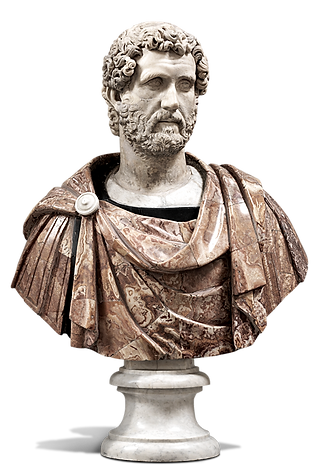Suetonius a.k.a. Emperor Titus Antoninus Pius

It is well known to those who study the classics that the individual known as Suetonius writes that Nero persecuted Christians, athough the context is not in relation to the Great Fire, and that he mentions a “Chrestus”. Suetonius appears to have been a ‘pen name’ of Emperor Antoninus Pius, a grandson of Arrius Piso, through his daughter Claudia Phoebe, as shown above. When researching further, however, certain information supports that Suetonius must have been Antoninus Pius. For one, the name ‘Suetonius’ is a clue, because if we break the name up we can see it linking to his grandfather, but also incorporating what Suetonius wanted to be famous for, his sayings, one of which was “Nothing is more unpredictable than the mob, nothing more obscure than public opinion, nothing more deceptive than the whole political system.”
But the saying which looks to link the name 'Suet-onius' with the name Arrius is ‘birds of a feather, flock together’, and he gave info about bird tongues being a favorite food of at least one certain emperor, Vitellius. (ref-Suetonius, The Twelve Caesars, Life of Vitellius, chapter 13)
Many hundreds or thousands of birds had to be caught to supply that many tongues, meaning suet would have been used as bait, for which they could then be trapped. ‘Suet’, pronounced ‘sue-it’, was a bird food made of rendered fat and seed, and in Greek, the word ‘Lipos’ has the same meaning as ‘suet’. Rearranging the word 'Lipos' produces L. Piso. The other half of the ‘Suetonius’ name is ‘Onius’, which with the vowel play utilised by royalty (as explained in my book) and with N changed to R gives us ‘Anius’/Arius; Lucius Piso was the Uncle of Arrius. When Arrius' father was forced to commit suicide, Lucius, the brother of Arrius' father, became the adoptive father of Arrius. Therefore, the adoptive great-grandfather of Antoninus Pius would be L. Piso.
Titus Aurelius Fulvus Boionius Arrius Antoninus' father must have been T. Aurelius Fulvus (Rufus Corelius) and his mother, Claudia Phoebe (Pompeia Plotina), her second husband being Emperor Trajan, and his half-brother was Arrian, who wrote histories as Arrian and Appian, as well as other works. We learn from ‘Suetonius’ that he was very close to Emperor Hadrian, even at one point describing how he presented a statuette he owned of Augustus to Hadrian, presumably passed down from his family. With this gesture ‘Suetonius’ either genuinely admires Hadrian, or he was attempting to get on Hadrian’s good side; maybe to increase the chances of being chosen as Hadrian’s successor?
In the book Creating Christianity I explain how Hadrian changed his mind regarding Julius Piso (Arrius' son) becoming emperor and choosing Antoninus Pius to succeed him instead, and given the time frame when ‘Suetonius’ wrote his work and Antoninus became emperor, the correlation becomes apparent. Throughout his work, ‘Suetonius’ makes sure to describe the Caesars as being larger than life and greatly superior to the average man, even giving us the phrase; “Hail Caesar! We (common men) who are about to die, salute you!” This phrase presents the death of the common man, in that situation, as simply to entertain the emperor. (ref-Suetonius, The Twelve Caesars, The Life of Claudius, pg. 195, verse 21)”
He also talks about Cleopatra as “the most famous” of Julius Caesar’s mistresses and being so wonderful as the Queen of Egypt, but when tracing Antoninus’ ancestry back through his mother, that particular Cleopatra is revealed as his ancestor, through Mark Anthony. Suetonius’ (Antoninus Pius’) half-brother, Arrian, was the son of Emperor Trajan, through Trajan’s wife, Ulpia, before his marriage to Claudia Phoebe.
Note - The name 'Chrestus' in the work of 'Suetonius' totals 26 in Greek small numbering (the 0's removed as Romans did not use 0's). 26 spells KP (Kalpurnius Piso), according to the sequence those letters appear in the Greek alphabet, K is the 10th letter and Pi is the 16th. If spelled normally as ‘Christus’, it would total 22. Now this explanation for the use of the word/name Chrestus in Suetonius may be considered conjectural, however, so is the current view that it is a reference to Jewish disputes over the Jesus “Christus”/Χριστός of Christianity.
Antoninus Pius also appears to have written as 'Irenaeus' (the bishop of Lyons). Antoninus ("Suetonius Tranquillus") became "Irenic" (meaning 'peaceful') and wrote as "St. Irenaeus". Antoninus deliberately, again, misspelled Christos in his writing 'Against Heresies', this time as Chreistos, because this word totaled 27 in Greek and spelled the name Plinios (Pliny The Younger).
Antoninus' half-brother Arrian looks to have written as the "Shepherd (or Pastor) of Hermas", as he is declared as the bother of Pope Pius I.

